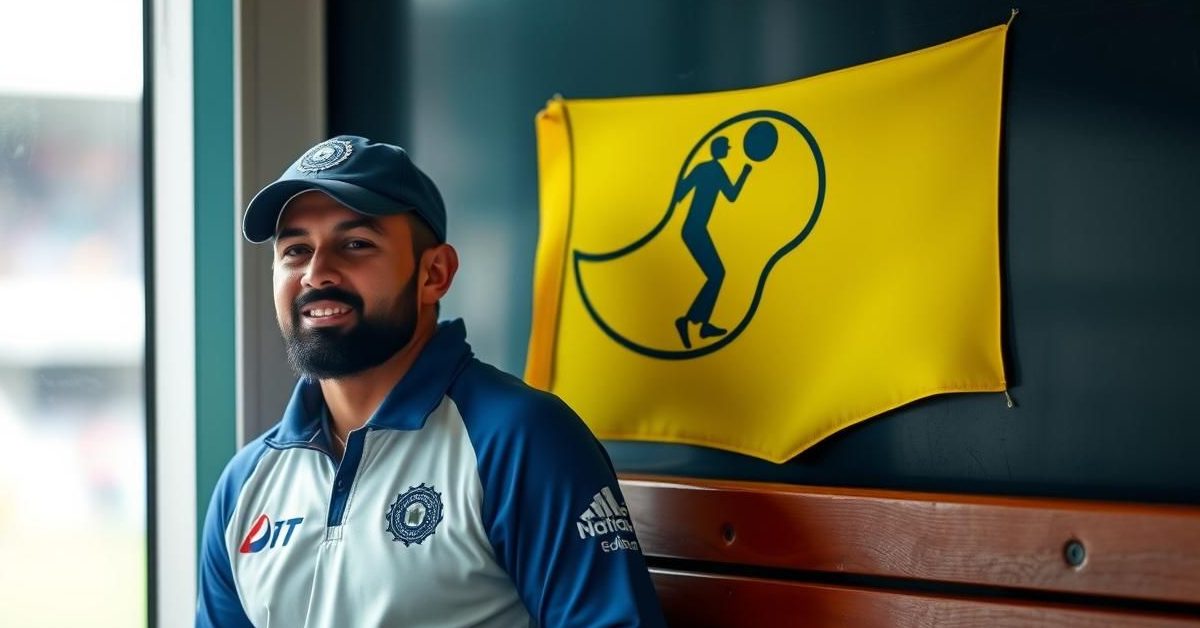Ben Stokes has transformed from a promising but troubled talent into England’s unwavering cricket talisman, conquering personal demons to become an inspirational leader on the field.
The All-Weather Performer
During a recent Test match at Lord’s, England’s Ben Stokes displayed immense grit, bowling tirelessly for long spells. He seemed to carry the weight of his team, refusing to let go of the ball, almost as if he trusted no one else.
Physically battered, with veins bulging and eyes sunken, Stokes tirelessly clapped and yelled encouragement to his teammates. His relentless effort demonstrated a profound willingness to do anything for England’s success.
A Challenging Beginning
This unwavering dedication is a stark contrast to his earlier career. Just 12 years ago, former England coach Andy Flower questioned Stokes’s commitment, telling him he cared more about partying than playing for his country.
Stokes had broken team curfew during an England Lions tour, returning late and fueling concerns about a self-destructive streak that threatened to derail his immense talent.
Confronting Inner Demons
In 2013, struggling with his performance, Stokes sought help from psychologist Mark Bawden. He was “bottling up” his emotions, a pattern Bawden termed the “Bottle Bottle Bang” syndrome, where pent-up feelings would eventually explode.
A prime example was in March 2014, when frustration led Stokes to punch a locker, breaking his hand and missing the ICC World T20. To manage his anger, Bawden gave him a simple routine: go to the dressing room and pack his kit bag, a calming exercise that still helps him today.
Trusting the Process
Bawden categorizes athletes as “Assassins” (thinkers) or “Warriors” (feelers), placing Stokes firmly in the warrior group. He taught Stokes that confidence isn’t the absence of fear or doubt, but “trust in your method.”
This understanding has been crucial for Stokes. Even if a shot goes awry or wickets don’t fall despite his efforts, he maintains his composure and sticks to his game plan.
The Path to Leadership
Stokes faced more challenges, including a career-threatening pub incident, the devastating loss of his father, and a break for mental health issues. Yet, he emerged stronger.
He became a hero in both the ODI and T20 World Cup wins and then took on the Test captaincy, revitalizing the team alongside coach Brendon McCullum. Even former captain Joe Root has stated he’s never enjoyed cricket more than under Stokes’s leadership.
This renewed mental strength was on full display at Lord’s, where he battled against India’s Ravindra Jadeja in a magnificent deadlock. Stokes’s persistence paid off when a crucial breakthrough finally sealed the match, allowing him to pack his kit bag with unbridled joy.
- Ben Stokes overcame a troubled past marked by disciplinary issues and emotional outbursts.
- Seeking help from a psychologist taught him to manage his anger and understand his “warrior” mindset.
- His confidence is rooted in “trusting his method” rather than the absence of doubt.
- Despite facing significant personal tragedies and mental health struggles, he returned to lead England to major successes.
Stokes’s journey is a powerful testament to resilience and the transformative power of confronting one’s inner struggles.
The user wants me to rewrite a news article about Ben Stokes into a mobile-first, high-engagement format.
Here’s the plan:
1. **Introductory Paragraph:** A single sentence summary of the article’s core theme (Stokes’ transformation).
2. **Section Headings:** Break down the narrative into logical parts using `
` tags.
* The Relentless Warrior
* A Turbulent Past
* Seeking Support
* Understanding the Mindset
* From Adversity to Leadership
3. **Paragraph Length:** Keep paragraphs short (1-3 sentences).
4. **Tone:** Clear and conversational.
5. **Key Takeaways:** Include a `
- ` list summarizing the main points.
6. **HTML Formatting:** Ensure all output is wrapped in `
` and uses `
`, `
`, `
`, `
- ` correctly.
7. **Length:** Aim for 300-600 words.
8. **Exclusions:** No H1, emojis, or asterisks.
Let’s go through the original article and map content to sections:
* **Original:** Stokes’s current performance at Lord’s, tireless bowling, not trusting others, rallying teammates.
* **Mapped to:** “The Relentless Warrior”
* **Original:** Andy Flower quote, breaking curfew, self-destructive streak.
* **Mapped to:** “A Turbulent Past”
* **Original:** Meeting Mark Bawden, feeling down, “Bottle Bottle Bang” syndrome, punching locker, packing kit bag technique.
* **Mapped to:** “Seeking Support”
* **Original:** Bawden’s classification (Assassins/Warriors), Stokes as a ‘Warrior’, definition of confidence (“trust in your method”).
* **Mapped to:** “Understanding the Mindset”
* **Original:** Pub fight, father’s death, mental health break, ODI & T20 World Cups, Test captaincy, Joe Root’s comment, Lord’s match conclusion.
* **Mapped to:** “From Adversity to Leadership”
* **Key Takeaways:** Extract 3-4 concise points about his transformation and lessons.
* **Closing Remark:** A brief final thought.
I will ensure the language is engaging and easy to read on a mobile device, using active voice where appropriate. I will also check the word count after drafting.
Confidence Check: I’m confident I can meet all requirements. The article content naturally breaks down into the requested structure, and the tone is straightforward to achieve. The word count will need careful management during drafting to stay within the 300-600 range.
Ben Stokes has transformed from a promising but troubled talent into England’s unwavering cricket talisman, conquering personal demons to become an inspirational leader on the field.
The Relentless Warrior
During a recent Test match at Lord’s, England’s Ben Stokes displayed immense grit, bowling tirelessly for long spells. He seemed to carry the weight of his team, refusing to let go of the ball, almost as if he trusted no one else to do the job.
Physically battered, with veins bulging and eyes sunken, Stokes tirelessly clapped and yelled encouragement to his teammates. His relentless effort demonstrated a profound willingness to do anything for England’s success.
A Turbulent Past
This unwavering dedication is a stark contrast to his earlier career. Just 12 years ago, former England coach Andy Flower questioned Stokes’s commitment, telling him he cared more about partying than playing for his country.
Stokes had broken team curfew during an England Lions tour, returning late and fueling concerns about a self-destructive streak that threatened to derail his immense talent.
Seeking Support
In 2013, struggling with his performance, Stokes sought help from psychologist Mark Bawden. He was “bottling up” his emotions, a pattern Bawden termed the “Bottle Bottle Bang” syndrome, where pent-up feelings would eventually explode.
A prime example was in March 2014, when frustration led Stokes to punch a locker, breaking his hand and missing the ICC World T20. To manage his anger, Bawden gave him a simple routine: go to the dressing room and pack his kit bag, a calming exercise that still helps him today.
Understanding the Mindset
Bawden categorizes athletes as “Assassins” (thinkers) or “Warriors” (feelers), placing Stokes firmly in the warrior group. He taught Stokes that confidence isn’t the absence of fear or doubt, but “trust in your method.”
This understanding has been crucial for Stokes. Even if a shot goes awry or wickets don’t fall despite his efforts, he maintains his composure and sticks to his game plan.
From Adversity to Leadership
Stokes faced more challenges, including a career-threatening pub incident, the devastating loss of his father, and a break for mental health issues. Yet, he emerged stronger.
He became a hero in both the ODI and T20 World Cup wins and then took on the Test captaincy, revitalizing the team alongside coach Brendon McCullum. Even former captain Joe Root has stated he’s never enjoyed cricket more than under Stokes’s leadership.
This renewed mental strength was on full display at Lord’s, where he battled against India’s Ravindra Jadeja in a magnificent deadlock. Stokes’s persistence paid off when a crucial breakthrough finally sealed the match, allowing him to pack his kit bag with unbridled joy.
- Ben Stokes overcame a troubled past marked by disciplinary issues and emotional outbursts.
- Seeking help from a psychologist taught him to manage his anger and understand his “warrior” mindset.
- His confidence is rooted in “trusting his method” rather than the absence of doubt.
- Despite facing significant personal tragedies and mental health struggles, he returned to lead England to major successes.
Stokes’s journey is a powerful testament to resilience and the transformative power of confronting one’s inner struggles.
6. **HTML Formatting:** Ensure all output is wrapped in `
`, `
`, `
- `, `
- ` correctly.
7. **Length:** Aim for 300-600 words.
8. **Exclusions:** No H1, emojis, or asterisks.Let’s go through the original article and map content to sections:
* **Original:** Stokes’s current performance at Lord’s, tireless bowling, not trusting others, rallying teammates.
* **Mapped to:** “The Relentless Warrior”* **Original:** Andy Flower quote, breaking curfew, self-destructive streak.
* **Mapped to:** “A Turbulent Past”* **Original:** Meeting Mark Bawden, feeling down, “Bottle Bottle Bang” syndrome, punching locker, packing kit bag technique.
* **Mapped to:** “Seeking Support”* **Original:** Bawden’s classification (Assassins/Warriors), Stokes as a ‘Warrior’, definition of confidence (“trust in your method”).
* **Mapped to:** “Understanding the Mindset”* **Original:** Pub fight, father’s death, mental health break, ODI & T20 World Cups, Test captaincy, Joe Root’s comment, Lord’s match conclusion.
* **Mapped to:** “From Adversity to Leadership”* **Key Takeaways:** Extract 3-4 concise points about his transformation and lessons.
* **Closing Remark:** A brief final thought.
I will ensure the language is engaging and easy to read on a mobile device, using active voice where appropriate. I will also check the word count after drafting.
Confidence Check: I’m confident I can meet all requirements. The article content naturally breaks down into the requested structure, and the tone is straightforward to achieve. The word count will need careful management during drafting to stay within the 300-600 range.
Ben Stokes has transformed from a promising but troubled talent into England’s unwavering cricket talisman, conquering personal demons to become an inspirational leader on the field.
The Relentless Warrior
During a recent Test match at Lord’s, England’s Ben Stokes displayed immense grit, bowling tirelessly for long spells. He seemed to carry the weight of his team, refusing to let go of the ball, almost as if he trusted no one else to do the job.
Physically battered, with veins bulging and eyes sunken, Stokes tirelessly clapped and yelled encouragement to his teammates. His relentless effort demonstrated a profound willingness to do anything for England’s success.
A Turbulent Past
This unwavering dedication is a stark contrast to his earlier career. Just 12 years ago, former England coach Andy Flower questioned Stokes’s commitment, telling him he cared more about partying than playing for his country.
Stokes had broken team curfew during an England Lions tour, returning late and fueling concerns about a self-destructive streak that threatened to derail his immense talent.
Seeking Support
In 2013, struggling with his performance, Stokes sought help from psychologist Mark Bawden. He was “bottling up” his emotions, a pattern Bawden termed the “Bottle Bottle Bang” syndrome, where pent-up feelings would eventually explode.
A prime example was in March 2014, when frustration led Stokes to punch a locker, breaking his hand and missing the ICC World T20. To manage his anger, Bawden gave him a simple routine: go to the dressing room and pack his kit bag, a calming exercise that still helps him today.
Understanding the Mindset
Bawden categorizes athletes as “Assassins” (thinkers) or “Warriors” (feelers), placing Stokes firmly in the warrior group. He taught Stokes that confidence isn’t the absence of fear or doubt, but “trust in your method.”
This understanding has been crucial for Stokes. Even if a shot goes awry or wickets don’t fall despite his efforts, he maintains his composure and sticks to his game plan.
From Adversity to Leadership
Stokes faced more challenges, including a career-threatening pub incident, the devastating loss of his father, and a break for mental health issues. Yet, he emerged stronger.
He became a hero in both the ODI and T20 World Cup wins and then took on the Test captaincy, revitalizing the team alongside coach Brendon McCullum. Even former captain Joe Root has stated he’s never enjoyed cricket more than under Stokes’s leadership.
This renewed mental strength was on full display at Lord’s, where he battled against India’s Ravindra Jadeja in a magnificent deadlock. Stokes’s persistence paid off when a crucial breakthrough finally sealed the match, allowing him to pack his kit bag with unbridled joy.
- Ben Stokes overcame a troubled past marked by disciplinary issues and emotional outbursts.
- Seeking help from a psychologist taught him to manage his anger and understand his “warrior” mindset.
- His confidence is rooted in “trusting his method” rather than the absence of doubt.
- Despite facing significant personal tragedies and mental health struggles, he returned to lead England to major successes.
Stokes’s journey is a powerful testament to resilience and the transformative power of confronting one’s inner struggles.













